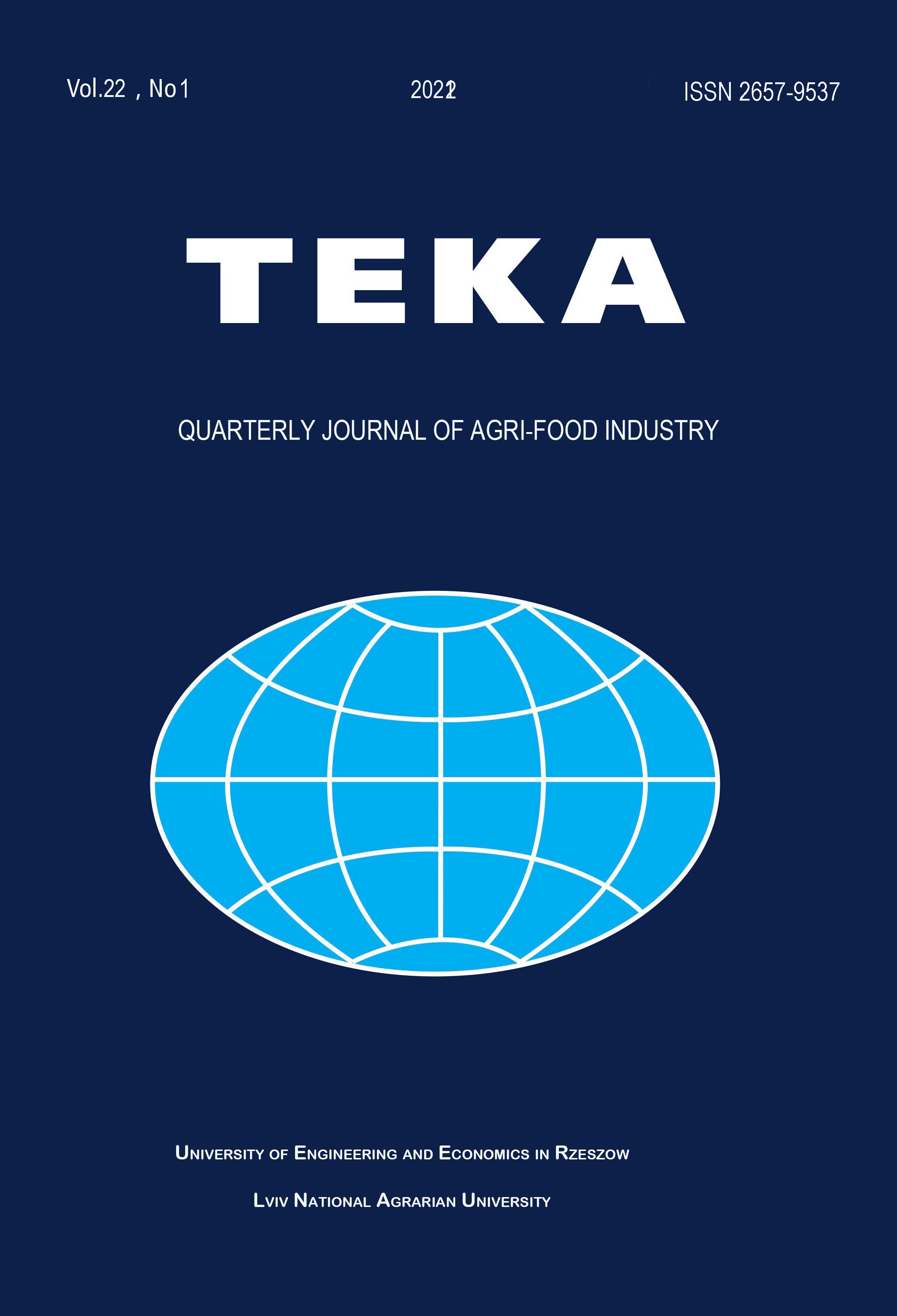JUSTIFICATION OF THE DIMENSIONS OF THE SLIDE-LIKE ELECTRIC FRICTION SEPARATOR SURFACE FOR SEPARATION OF WINTER PAPESEED
Keywords:
electric friction separator, surface length, winter rapeseed, separationAbstract
The article presents the results of the development of the theoretical determination of the optimum dimensions
of the surface of the electric friction slide-like separator for the parting of difficult-to-separate impurities or poor-
quality (fragile, with different degrees of shell damage) seeds from the seed mixture.
On the basis of a theoretical analysis of possible cases of the movement of particles of seed mixtures along a
moving inclined surface with an electric field superimposed on it, it was established that the determining parameters
that affect the path traveled by the seeds up or down the separator web, are the seeds, the angle of inclination of the
plane α, the movement velocity V e , the radius r, the mass m of the seed and the value of the electric force F e , as a result
of the impact of the applied electric field. It is thanks to the additional impact of the electric force that it becomes
possible to significantly reduce the distance of low-quality seeds rolling along the surface and increase the path they
travel along with the surface in the direction of its movement.
The obtained analytical dependences make it possible to determine the minimum distance from the edge of the
surface to the line of seed supply to it. For technological reasons, these distances should be increased due to the fact
that they may come into contact with seeds that roll down, and due to the presence of rounded areas at the ends of the
operating area of the surface, formed by the location of drive and tension rollers of a certain diameter.
As a result of the research, it was established that in order to carry out the technological process of rapeseed
separation with the intention to separate low-quality (weak and of different damage degress) seeds, the working length
of the surface of the electric friction slide-like separator should be 0.6 m.
References
Batsurovska I.O. 2021. Elektrotekhnolohii: navchalnyi
posibnyk. Mykolaiv: MNAU. P. 258
Vasylenko P. M. 1960. Teoryia dvyzhenyia chastyts po
sherokhovatym poverkhnostiam
selskokhoziaistvennych mashyn. Kyev: UASKhN.
P. 284
Zakharov D.O. 2017. Elektrofizychni metody obrobky
silskohospodarskoi produktsii. Metodychni
rekomendatsii. Navchalne vydannia. MNAU. P. 39
Yermak V. P. Bohdanov Ye. V., Ilchenok A. A. 2012.
Klasyfikatsiia zasobiv separatsii ta konstruktsii
mashyn dlia vidboru nasinnia z vysokymy
posivnymy vlastyvostiamy. Zbirnyk naukovykh
prats Luhanskoho natsionalnoho ahrarnoho
universytetu № 35. P. 127 – 132.
Inozemtsev H.B., Paraniuk V.O., Kovalyshyn S.I., Shvets
O.P., Mellnychuk V.I. 2010. Nasinnieochysna
hirka. Patent na korysnu model № 50435 Biul.
№11. P. 4
Kovalyshyn S., Shvets O., Salo Ya., Kuzma Ya-R. 2015.
Vplyv dodatkovoi elektrychnoi syly na efektyvnist
rozdilennia nasinnia ripaku na elektrofryktsiinomu
separatori . Visnyk LNAU “Ahroinzhenerni
doslidzhennia” №19, P. 45-51.
Kovalyshyn S. Y., Shvets O.P. 2011. Zastosuvannia
elektrychnoho polia koronnoho rozriadu pid chas
peredposivnoi obrobky nasinnia ozymoho ripaku.
Motrol: Motoryzacia I energetyca rolnictwa. Tom
D. – Lublin: Ukrainski technologii, P. 276 –
Matviichuk V.A., Rubanenko O.Ie., Stadniichuk I.P.
Elektrotekhnolohii v APK: navchalnyi
posibnyk. Vinnytsia: TOV «Tvory». 272 s.
Nishchenko I.O. Kovalyshyn S.I., Shvets O.P. 2008.
Doslidzhennia protsesu separuvannia nasinnia
ozymoho ripaku na rukhomii v elektrychnomu
poli pokhylii ploshchyni. Visnyk LNAU
“Ahroinzhenerni doslidzhennia”. №12, T. 2., P.
– 230.
Nishchenko I. O., Shvets O. P. 2009. Doslidzhennia
traiektorii rukhu chastynok nasinnievoi sumishi
kuliastoi formy po rukhomii v elektrychnomu poli
fryktsiinii ploshchyni. Visnyk DDAU. Spetsialnyi
vypusk №2-09., P. 256-259.
Paraniuk V.O. Kovalyshyn S.I., Melnychuk V.I., Shvets
O.P. 2007. Fizychni osnovy tekhnolohii
separuvannia nasinnia silskohospodarskykh
kultur. Zb. nauk. pr. UkrNDIPVT im. L.
Pohoriloho: Tekhniko-tekhnolohichni aspekty
rozvytku ta vyprobuvannia novoi tekhniky i
tekhnolohii dlia silskoho hospodarstva Ukrainy.
Vyp. 10 (24), K.1, P. 77 – 86.
Shvets O.P. 2013. Analiz rezultativ matematychnoho
opysu rukhu nasinnia ripaku po separuvalnii
ploshchyni elektrofryktsiinoho separatora. Visnyk
LNAU “Ahroinzhenerni doslidzhennia” №17, P.
-149.
Shvets O.P. 2010. Doslidzhennia ta vplyv kuta rivnovahy
nasinnia ozymoho ripaku na traiektoriiu yoho
rukhu po robochii poverkhni elektrofryktsiinoho
separatora. Zahalnoderzhavnyi mizhvidomchyi
nauk.-tekhn. zb. Kirovohradsk. nats. tekhn. un-tu:
Konstruiuvannia, vyrobnytstvo ta ekspluatatsiia
silskohospodarskykh mashyn. Vyp. 40, Ch.2, P.
– 241.
Shvets O.P. 2012. Obgruntuvannia parametriv ta
rezhymiv roboty separatora nasinnia ozymoho
ripaku: dys. kand. tekhn. nauk: – Lviv, 165 s.
Basiry M., Esehaghbeygi M. 2012. Cleaning and
charging of seeds with an electrostatic separator.
Applied Engineering in Agriculture. 28, 1. P.
–147.
Kovalyshyn S. Shvets O., Grundas S., Tys J. 2013. Use
of the electro-separation method for improvement
of the utility value of winter rapeseeds. Int.
Agrophys. 27., P. 419 – 424.
Kovalyshyn S. Shvets O., Holodnyak R. 2010.
Description of parameters of electric separator of
rape seed mixtures. Teka. Commision of
motorization and power industry in agriculture.
Volume X., P. 186 – 193.
Kovalyshyn S., Shvets O, Sosnowski S. 2017. The
justification of the parameters of the dosage
device for the electric frictional separator .
MOTROL. Commission of Motorization and
Energetics in Agriculture 19 (4), P. 69-72.
Kovalyshyn S. Shvets O. 2017. Investigation of
equilibrium angles of winter rapeseed on an
inclined plane of an electrofrictional separator and
optimization of the irgeometrical sizes. Тeka.
Commision ofmotorization andenergetics in
agriculture 17 (No.1.), P. 45-52.

